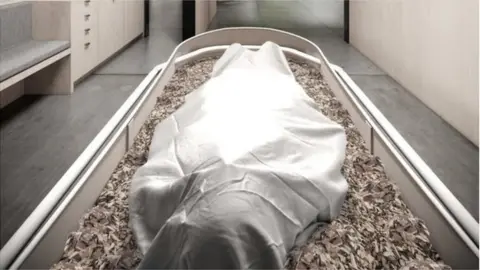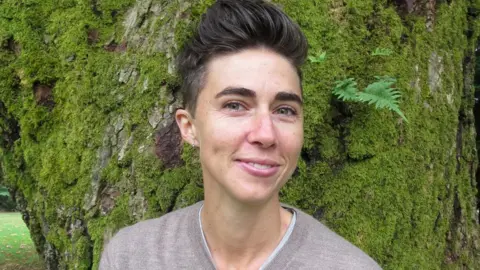Human compost funerals 'better for environment'
 Olson Kundig
Olson KundigA US firm has given scientific details of its "human composting" process for environmentally friendly funerals.
A pilot study on deceased volunteers showed that soft tissue broke down safely and completely within 30 days.
The firm, Recompose, claims that its process saves more than a tonne of carbon, compared to cremation or traditional burial.
It says that it will offer the world's first human composting service in Washington state from next February.
Speaking exclusively to BBC News, Recompose's chief executive and founder, Katrina Spade, said that concerns about climate change had been a big factor in so many people expressing interest in the service.
"So far 15,000 people have signed up to our newsletter. And the legislation to allow this in the state received bi-partisan support enabling it to pass the first time it was tabled," she said.
"The project has moved forward so quickly because of the urgency of climate change and the awareness we have to put it right."
 Recompose
RecomposeMs Spade spoke to me as results of the scientific study into the composting process, which Recompose calls natural organic reduction, was being presented at the American Association for the Advancement of Science meeting in Seattle.
"There is a loving practicability to it," she said, in one of the few interviews she has given since announcing details of the project a year ago.
She told me that she came up with the idea 13 years ago when she began to ponder her own mortality - at the ripe old age of 30!
"When I die, this planet, which has protected and supported me my whole life, shouldn't I give back what I have left?
"It is just logical and also beautiful."
Ms Spade draws a distinction between decomposing and recomposing. The former is what happens when a body is above ground. Recomposing involves integrating it with the soil.
She claims that natural organic reduction of a body prevents 1.4 tonnes of carbon being released into the atmosphere, compared with cremation. And she believes there is a similar saving compared to traditional burial when transportation and the construction of the casket is taken into account.
"For a lot of folks it resonates with the way they try to lead their lives. They want to pick a death care plan that resonates with the way they live."
The process involves laying the body in a closed vessel with woodchips, alfalfa and straw grass. The body is slowly rotated to allow microbes to break it down.
 Recompose/MOLT Studios
Recompose/MOLT StudiosThirty days later the remains are available to relatives to scatter on plants or a tree.
Although the process is straightforward, it has taken four years of scientific research to perfect the technique. Ms Spade asked soil scientist Prof Lynne Carpenter Boggs to undertake the work.
Composting livestock is a well-established practice in Washington state. Prof Carpenter Boggs's task was to adapt it for human subjects and ensure that the remains were environmentally safe.
She carried out pilot studies with six volunteers who had given their enthusiastic consent to the research prior to their deaths. She told me that the work took an emotional toll on her and her team.
"We all kept checking in on each other. My physiology felt different, I wasn't sleeping well for a few nights, I wasn't hungry - it was a distress response."
Prof Carpenter-Boggs found that the recomposing body reached temperatures of 55C (131F) for a period of time.
"We are certain that there has been a destruction of the vast majority of [disease-causing organisms] and pharmaceuticals because of the high temperatures that we reached."
Recompose will begin business later this year. Anyone can participate but the process is legal only in Washington state. Legislation to allow natural organic reduction is currently being considered in Colorado. Ms Spade believes that it will be a matter of time before it is more widely available - in the US and elsewhere.
"We hope other states will pick up the idea once we get going in Washington. We have had lots of excitement from the UK and other parts of the world and we hope to open branches overseas when we can."
